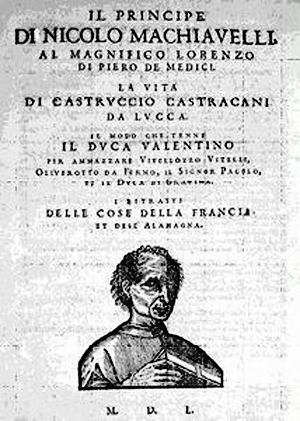Niccolò Machiavelli: The Prince (1532–) [IT, EN, RO, FR, CZ, DE, PT, SK, ES]
Filed under book | Tags: · governance, political philosophy, political science, political theory, politics

“Here is the world’s most famous master plan for seizing and holding power. Astonishing in its candor The Prince even today remains a disturbingly realistic and prophetic work on what it takes to be a prince … a king … a president. When, in 1512, Machiavelli was removed from his post in his beloved Florence, he resolved to set down a treatise on leadership that was practical, not idealistic. In The Prince he envisioned would be unencumbered by ordinary ethical and moral values; his prince would be man and beast, fox and lion. Today, this small sixteenth-century masterpiece has become essential reading for every student of government, and is the ultimate book on power politics.”
Il Principe (Italian, ed. Sálvio Marcelo Soares, 2009)
The Prince (English, trans. Luigi Ricci, 1903/1921)
Principele (Romanian, trans. Sorin Ionescu [pseudonym of Nina Façon], 1943, added on 2014-9-3), 1999 edition
Le prince (French, trans. Jean-Marie Tremblay, 1962)
The Prince (English, trans. James B. Atkinson, 1976/2008)
The Prince (English, trans. Harvey C. Mansfield, 1985/1998, blanked out sections repaired on 2018-9-1 via Nathan Hoepner)
Vladař (Czech, trans. Josef Hajný, 1986)
Der Fürst (German, trans. Friedrich von Oppeln-Bronikowski, 1990)
O Príncipe (Portuguese, trans. Maria Julia Goldwasser, 1990/2001)
Vladár (Slovak, trans. Pavol Koprda and Blahoslav Hečko, 1992)
The Prince (English, trans. Peter Bondanella, 2005)
O Príncipe (Portuguese, trans. Antonio D’Elia, 2006)
El Príncipe (Spanish, undated)
Henri Lefebvre: State, Space, World: Selected Essays (2009)
Filed under book | Tags: · capitalism, geography, globalisation, history, neoliberalism, philosophy, political theory, politics, sociology, space, state

“One of the most influential Marxist theorists of the twentieth century, Henri Lefebvre pioneered the study of the modern state in an age of accelerating global economic integration and fragmentation. Shortly after the 1974 publication of his landmark book The Production of Space, Lefebvre embarked on one of the most ambitious projects of his career: a consideration of the history and geographies of the modern state through a monumental study that linked several disciplines, including political science, sociology, geography, and history.
State, Space, World collects a series of Lefebvre’s key writings on the state from this period. Making available in English for the first time the as-yet-unexplored political aspect of Lefebvre’s work, it contains essays on philosophy, political theory, state formation, spatial planning, and globalization, as well as provocative reflections on the possibilities and limits of grassroots democracy under advanced capitalism.
State, Space, World is an essential complement to The Production of Space, The Urban Revolution, and The Critique of Everyday Life. Lefebvre’s original and prescient analyses that emerge in this volume are urgently relevant to contemporary debates on globalization and neoliberal capitalism.”
Edited by Neil Brenner and Stuart Elden
Translated by Gerald Moore, Neil Brenner, and Stuart Elden
Publisher University of Minnesota Press, 2009
ISBN 081665316X, 9780816653164
330 pages
PDF, PDF (updated on 2020-7-31)
Comments (2)Michael J. Thompson (ed.): Georg Lukács Reconsidered: Critical Essays in Politics, Philosophy and Aesthetics (2011)
Filed under book | Tags: · aesthetics, capitalism, critical theory, cultural criticism, ethics, law, literary criticism, marxism, philosophy, political theory, politics

Georg Lukács stands as a towering figure in the areas of critical theory, literary criticism, aesthetics, ethical theory and the philosophy of Marxism and German Idealism. Yet, despite his influence throughout the twentieth century, his contributions to the humanities and theoretical social sciences are marked by neglect. What has been lost is a crucial thinker in the tradition of critical theory, but also, by extension, a crucial set of ideas that can be used to shed new light on the major problems of contemporary society.
This book reconsiders Lukács’ intellectual contributions in the light of recent intellectual developments in political theory, aesthetics, ethical theory, and social and cultural theory. An international team of contributors contend that Lukács’ ideas and theoretical contributions have much to offer the theoretical paucity of the present. Ultimately the book reintegrates Lukács as a central thinker, not only in the tradition of critical theory, but also as a major theorist and critic of modernity, of capitalism, and of new trends in political theory, cultural criticism and legal theory.
Publisher Continuum, 2011
ISBN 1441108769, 9781441108760
253 pages
PDF, PDF (updated on 2014-12-22)
Comment (0)
